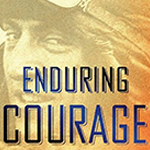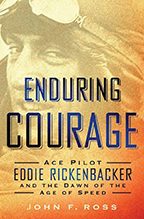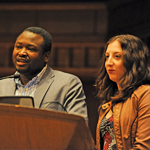BETWEEN THE LINES: MEDITATING ON THE NATURE OF COURAGE

 In Enduring Courage: Ace Pilot Eddie Rickenbacker and the Dawn of the Age of Speed (St. Martin’s Press, 2014), John F. Ross ’81 examines the life of a World War I flying ace who persevered.
In Enduring Courage: Ace Pilot Eddie Rickenbacker and the Dawn of the Age of Speed (St. Martin’s Press, 2014), John F. Ross ’81 examines the life of a World War I flying ace who persevered.
I first encountered the subject of my latest book as a 10-year-old with a flashlight clenched between cheek and bony shoulder. After my mother turned out the bedroom lights, I liked nothing better than pulling a book from beneath my pillow. That way I met Long John Silver, Joe DiMaggio, Toad of Toad Hall, Dr. Moriarty, a wild wolf in the Yukon, and an old man at sea. Something marvelous happened when I opened Eddie Rickenbacker’s Fighting the Flying Circus, his World War I memoir of flying claptrap biplanes against the German air corps trained by the terrifying Red Baron. How those black and white words turned Technicolor was magic itself as Rickenbacker engaged in dogfights miles above the earth. And the magic continued until I could not keep my eyes open—or my mother confiscated the flashlight.
I can attest that the kernels of fascination and curiosity collected in childhood can remain alive and fertile decades later. When Rickenbacker’s name came up over dinner with my agent, a book project was born.
Born in Columbus, Ohio, in 1890, Eddie Rickenbacker, son of a Swiss-German immigrant family, grew up poor and often went hungry, but somehow persevered against a lifetime of obstacle and insult, vaulting the air corps’ pilot requirement for a college education (he’d dropped out in seventh grade) to become the ace of aces and an officer who commanded America’s most decorated squadron. Not only that but he went on to build a car company, run the Indianapolis Motor Speedway, and found Eastern Air Lines. Both escape from anonymity and a burning desire for respect certainly motivated him, but did not entirely explain the extraordinary flowering of his life. I pored over hundreds of thousands of words he wrote—some ghostwritten, others scribbled in cramped hand on a field cot, yet others dictated in his dotage—for clues to what set him apart.
Halfway through my research, it came to me rather suddenly that I was engaged in a meditation on the nature of courage. How do we negotiate between timidity and recklessness? (Aristotle described courage this way, believing it to be the highest of virtues.) Time and again Rickenbacker was knocked down or told he could not achieve something, but he got back up and tried again—his astounding courage emerged in the knowledge that he could physically and intellectually overcome virtually anything thrown his way. This courage is not the white-hot stuff conceived in emergency, when a sudden horror enables one to throw a car off a pinned child, for instance, but a steady, enduring kind that must be practiced every day, constantly tweaked, and applied consistently to all life’s travails.
After that realization, I would feel the cantankerous Rickenbacker every so often reach out beyond the grave to grip my lapels. Have you got the grit, he would demand? But I, too, had hard questions for him. His exploits and stories had so often been told and retold, his hero status so frequently cited and celebrated, that I felt I was looking at a remote, puzzling hero preserved under layer upon layer of clear shellac.
But soon I started finding cracks through this tough veneer. One of my most important primary resources was the oral interview he underwent with his ghostwriter for his autobiography in 1965, multiple weekly sessions over the course of a year, amounting to some 7,000 transcribed pages, a copy of which the Library of Congress owns. I got my son to help me scan it. After printing it out and putting it in a series of large binders, I indexed, tabbed, and annotated the material. Part interview, part dictation, this document is clear and revelatory, full of contradictions and selective memory, and the willful disregard for facts. Rickenbacker is at times irascible, hectoring his interviewer, but at others he is bemused and generous.
He lied flagrantly in the oral interview about a number of things, most notably the death of his father, claiming that the man had been foreman on a bridge construction project when a crane-load of wood had struck and killed him. Research revealed that his father had been a common laborer who provoked a fight with a racially hateful tirade that cost him his life. While Rickenbacker would not be the first or last person to hide an ugly past, he imagined his way into a world of control and dignity, rising to become a leader of men when his country needed him. We all figure out the story arc of our lives—understanding how he saw his life, a tangle of fantasy and facts, enabled me to draw closer to understanding Rickenbacker the man, not the hero, and the nature of the wizardry he employed to bring order to the crude indignities of life.
For the final chapter, I examined Rickenbacker’s experience adrift for 23 days with seven others on lifeboats in the Pacific during World War II. Without food and only rainwater, tortured by the sun, sharks and delirium, the men gave up all hope of rescue—all, that is, except Rickenbacker. At perhaps their lowest moment, a seabird landed on Rickenbacker’s head. Out of nowhere. Seven sets of eyes watched him as he slowly reached up, then snatched the bird, killed it, and turned its intestines into bait. The fish they caught would sustain them. Upon their rescue, all the others would acknowledge that it was Rickenbacker’s ability to place himself above misfortune that had gotten them all through that ordeal. There on those flimsy rubber boats no larger than bathtubs, fate, luck, and courage had intersected—and at the heart of it was the crusty World War I hero, resolutely facing down bad luck and maximizing good luck.
While I discovered vastly new things writing this book than I did in my darkened bedroom long ago, the same thrill is still there. It’s why I write.—JOHN F. ROSS
Author and journalist John F. Ross ’81 has written four books, traveled around the world on assignment for major magazines, and served as an editor at Smithsonian and American Heritage magazines. www.johnfross.com

